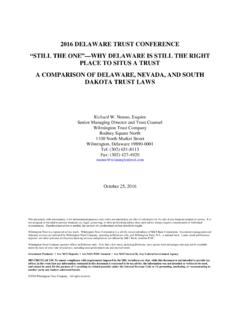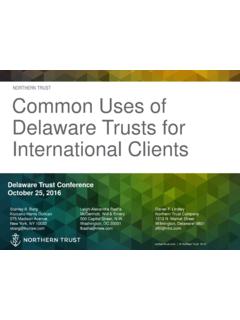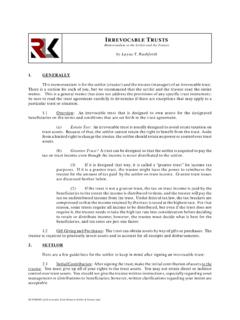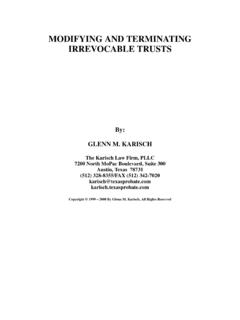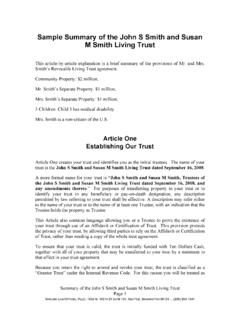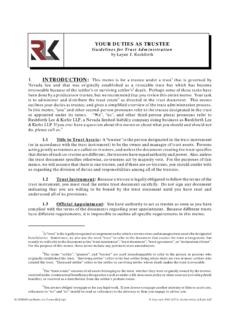Transcription of A Shiny New Tool For The Toolbox: Utilizing Delaware’s new ...
1 { } 1 A Shiny New Tool For The Toolbox: Utilizing Delaware s new statute allowing for broad trust modifications while the trustor is living By: Daniel F. Hayward Michael M. Gordon Peter S. Gordon Norris P. Wright As those of us working in the estate and wealth planning field are well aware, the ability to modify an irrevocable trust is critical for many reasons. Whether the goal is to deal with unanticipated circumstances, correct errors, improve the efficiency of a trust s administration, or take advantage of Delaware s sophisticated trust laws, having several tools available for trust modification (and, in particular, tools that do not require judicial intervention) can allow for some of even the most challenging trust issues to be resolved, while also helping to maintain Delaware s place as a favored jurisdiction for new and existing trusts.
2 This summer, Delaware added another powerful tool to its existing trust modification toolbox via the enactment of new Section 3342 of the Delaware Code, entitled Modification of trust by Consent While Trustor is living (and hereinafter referred to as the Nonjudicial Modification Statute ). The inspiration for the Nonjudicial Modification Statute can be found in Section 411 of the Uniform trust Code (the UTC ), which generally provides mechanisms for the modification or termination of irrevocable trusts with or without the involvement of the trustor. Delaware s enactment of the Nonjudicial Modification Statute continues the trend of the past several years of adopting select provisions of the UTC and tailoring such provisions to fit within Delaware s overall statutory system. Analyzing the Statutory Provisions The core of the Nonjudicial Modification Statute is found in paragraph (a), which reads as follows: (a) Notwithstanding any provision of law or a trust s governing instrument limiting or prohibiting amendment of the trust , an irrevocable trust may be modified to include any provision that could have been included in the governing instrument of a trust created upon the date of the modification by written consent or written non-objection of the trustor, all { } 2 then serving fiduciaries and all beneficiaries even if the modification violates a material purpose of the trust .
3 1 As indicated by this provision (and by the title of the statute), the consent or non-objection of the trustor of the trust is required, along with the consent or non-objection of all fiduciaries and beneficiaries. Therefore, the Nonjudicial Modification Statute can only be used to modify a trust when the trustor is living and, presumably, has the capacity to provide written consent or non-objection to the modification on the trustor s own behalf. What if the trustor is incapacitated? While Section 411(a) of the UTC specifically includes the ability of a guardian, conservator or attorney-in-fact to act on behalf of the trustor, the Nonjudicial Modification Statute currently does not. This is an issue likely to be resolved as the statute is further refined over time. The fiduciaries who need to take part in the modification will include all of the Trustees, any advisers or protectors pursuant to 12 Del.
4 C. 3313, and any designated representatives pursuant to 12 Del. C. 3339. As a practical point, it is important to remember that any party with the powers of an adviser or designated representative as set forth in their respective statutory sections is automatically deemed to be a fiduciary unless the trust s governing instrument specifically provides that such party shall not serve in a fiduciary capacity. However, although not required, out of an abundance of caution and for the sake of completeness, we suggest that any powerholder, whether or not a fiduciary, should be a party to an agreement modifying a trust pursuant to the Nonjudicial Modification Statute. The term beneficiaries is not defined in paragraph (a) of the statute, which naturally begs the question: do beneficiaries with very remote or contingent interests need to be a party to an agreement modifying a trust under the new statute?
5 The statute only states that all beneficiaries shall consent or not object, which strongly suggests that even the most remote beneficiaries must take part in the modification. On its face, this requirement would seem to be exceedingly difficult to meet. Thankfully, paragraph (c) of the statute (discussed further below) contemplates the use of Delaware s virtual representation statute, 12 Del. C. 3547, in order to bind the beneficial interests of those more remote than the presumptive remainder beneficiaries of the trust . Therefore, as a general rule of thumb, the Nonjudicial Modification Statute will require the participation of all beneficiaries with a current interest in the trust and the presumptive remainder beneficiaries ( , generally those whose interests would vest if the current interests terminated).
6 Absent a material conflict of interest, any minor, unborn or unascertainable beneficiaries, and any contingent remainder beneficiaries, may be virtually represented by the trust s adult current beneficiaries and presumptive remainder beneficiaries. It is important to be aware of situations where there may be a material conflict between classes of beneficiaries, especially given the potentially sweeping modifications that are possible under the Nonjudicial Modification Statute. For example, if the proposed trust modification is going to directly alter the beneficial interest of a contingent remainder beneficiary, then it may { } 3 not be proper for a presumptive remainder beneficiary to represent such contingent remainder beneficiary. If the Nonjudicial Modification Statute is being used to modify a trust s dispositive provisions, practitioners and trust professionals should very closely analyze whether virtual representation is proper.
7 The last portion of paragraph (a) of the statute is likely the most important, as it allows a trust to be modified even if the modification violates a material purpose of the trust (which is in direct contrast to Delaware s nonjudicial settlement agreement statute, which provides that such an agreement is only valid to the extent it does not violate a material purpose of the trust ).2 When viewed in conjunction with the language in paragraph (a) which provides that the modification may include the addition of any provisions that could have been included in the governing instrument of a trust created upon the date of modification, it is clear that the statute can be used to make substantial changes to the administrative structure of the trust . This would include, for example, the addition of provisions making a trust a directed trust as to investment and/or distribution decisions in accordance with 12 Del.
8 C. 3313, which can be especially useful for trusts that are migrating to Delaware from jurisdictions that do not allow for directed trusts. Beyond administrative changes to a trust , by its terms the Nonjudicial Modification Statute would allow for changes to a trust s dispositive provisions, including but not limited to the addition or removal of trust beneficiaries, changing the standard for the distribution of income or principal, extending the duration of the trust , and altering the interests of remainder and contingent remainder beneficiaries. In fact, a trust could, theoretically, be entirely amended and restated pursuant to the statute, with the trust being effectively rewritten to reflect how the trustor would have structured the trust if allowed a do-over, which is a desire that many trust professionals have likely heard more than once from their clients and customers.
9 When dealing with modifications to dispositive provisions, however, it is always critical to keep in mind potential tax consequences. For example, if the trust is exempt from the generation-skipping transfer tax, in most cases you will want to avoid changes that could be deemed to shift beneficial interests to lower generations or that delay the vesting of a beneficial interest. Just because the parties can modify a trust in a certain manner under the Nonjudicial Modification Statute doesn t necessarily mean that they should. The expansive nature of the statute is also reflected in the ability to modify a trust even if the trust s governing instrument includes a provision limiting or prohibiting amendment of the trust . Most recent trusts are likely to have a provision specifically prohibiting the trustor from amending or modifying the trust in order to avoid estate tax inclusion and possibly subjecting the trust assets to claims of the trustor s creditors.
10 Older trusts may include a provision that disallows any modifications to the trust unless approved by a court of competent jurisdiction. Regardless of such trust provisions, the Nonjudicial Modification Statute may still be employed to modify a trust , again underscoring the significant power of the statute. { } 4 Paragraph (b) of the statute provides as follows: (b) No fiduciary shall have a duty to consent to any proposed modification nor, absent willful misconduct, any liability to any person having an interest in the trust for failure to consent to any proposed modification. 3 This provision ensures that a fiduciary will not have to contend with the risk of potential liability for refusing to take part in a trust modification under the statute. trust beneficiaries or fiduciaries who are aware of the expansive modifications allowed under the Nonjudicial Modification Statute may seek to pressure the Delaware trustee to agree to modify the trust in a manner that provides a relative benefit to such beneficiaries or other fiduciaries.
